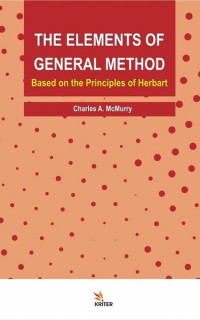
The Elements of General Method Based on the Principles of Herbart
| ISBN | 9786257033497 |
| Yayınevi | Kriter |
| Yazarlar | Yayınevi: Kriter (author) |
| Kitap Tanıtımı | The Herbart school adheres to this view of education, and has transferred its spirit and method to the schools. The Herbartians have the hardihood, in this age of moral skeptics, to believe not only in moral example but also in moral teaching. (By moral skeptics we mean those who believe in morals but not in moral instruction.) They seek first of all historical materials of the richest moral content, in vivid personification, upon which to nourish the moral spirit of children. If properly treated, this subject matter will soon win the children by its power over feeling and judgment. With Crusoe the child goes through every hardship and success; with Abraham he lives in tents, seeks pastures for his flocks, and generously marches out to the rescue of his kinsmen. He should not read Caesar with a slow and toilsome drag (parsing and construing) that would render a bright boy stupid. If he goes with Caesar at all, he must build an agger, fight battles, construct bridges, and approve or condemn Caesar's acts. But we doubt the moral value of Caesar's Gallic wars. By reading Plutarch we may see that the Latins and Greeks, before the days of their degeneracy, nourished their rising youth upon the traditions of their ancestry. The education produced a tough and sinewy brood of moral qualities. ) |
Kütüphaneniz